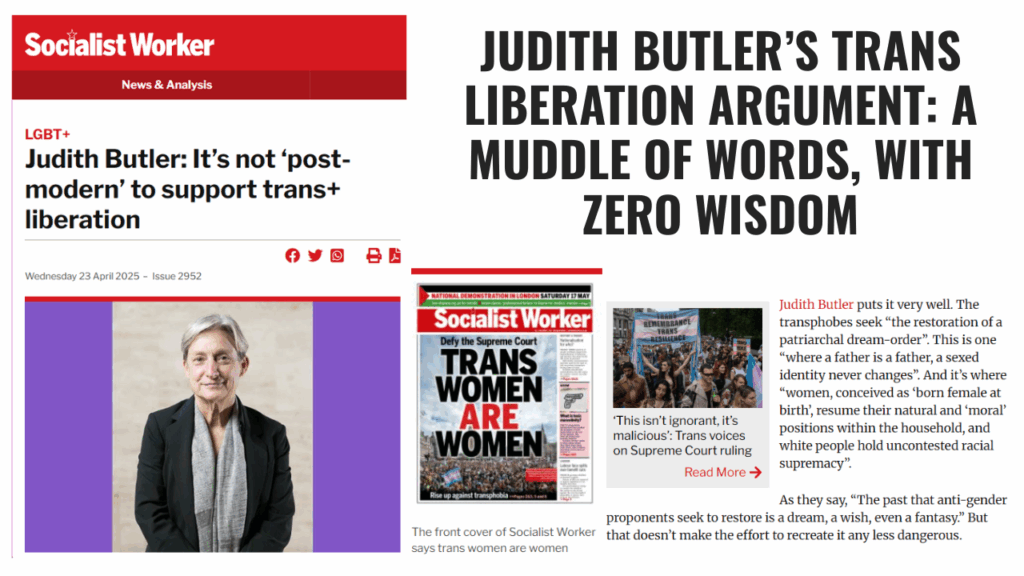Judith Butler’s latest piece in Socialist Worker, “It’s not ‘post-modern’ to support trans+ liberation,” is a masterclass in academic jargon masquerading as insight. Known for her dense, often impenetrable writing in works like Gender Trouble (1990), Butler tries to frame trans rights as a heroic stand against authoritarianism. Spoiler: it’s a mess. Her arguments collapse under scrutiny, relying on vague rhetoric, strawmen, and a refusal to engage with reality. Let’s break down where Butler goes wrong.

Authoritarianism as a Catch-All Bogeyman
Butler claims that restricting so-called “trans rights”, through healthcare limits or legal recognition, is state repression, lumping it in with detention and deportation. She writes, “If you think of rights-stripping as a form of state repression, on a spectrum with detention and deportation, then you see that authoritarian powers include all three kinds of legal destitution.” Sounds dramatic, but it’s a sloppy overreach.
Why It Falls Apart: Equating debates over “trans healthcare” with gulags or border crackdowns is absurd. Take the UK’s Cass Review (2022), which found little to no evidence for gender-affirming treatments for minors. It’s not jackboots stomping on so-called trans kids; it’s doctors and policymakers grappling with the medical ethics of abuse of power and medical malpractice. Butler ignores this, painting any restriction as fascist. That’s not an argument, it’s a tantrum. Her book Who’s Afraid of Gender? (2024) does the same, tossing around “authoritarianism” like confetti without defining it. Meanwhile, countries like Poland or Hungary, which Butler cites in other contexts, have unique cultural and political dynamics, not a global conspiracy. This lazy conflation shuts down discussion, not opens it.
The “Phantasm” Nonsense: Dodging Real Concerns
Butler loves the word “phantasm” to dismiss critics of her definition of trans activism, implying opposition is just irrational fear. She suggests anyone questioning “trans policies” is in bed with Trump, Putin, or the Pope. It’s a cheap shot meant to shut down debate and use emotional reaction in others to silence them, not inform or discuss, she has no interest in that.
Why It’s Rubbish: People aren’t scared of some ghostly “gender” monster; they’re worried about practical issues. Gender-critical feminists like Kathleen Stock point out that biological sex matters in places like women’s sports or prisons. A 2023 Sports Medicine study backs this up, showing men who claim to be trans women, keep strength advantages after hormone therapy. That’s not a “phantasm” it’s hard, cold facts and data. Butler waves this away, pretending critics are just hysterical. Even J.K. Rowling, vilified as a “TERF,” has said her concern is protecting women’s spaces. Butler’s refusal to engage with these points, instead smearing dissenters as fascist-adjacent, is intellectual cowardice. A 2021 UnHerd piece called this out, noting Butler’s habit of dodging “good faith disagreement” for dramatic posturing.
Smearing Gender-Critical Feminists
Speaking of “TERFs,” Butler’s article leans on her broader crusade against gender-critical feminists, accusing them of fuelling so-called anti-trans laws. She claims these feminists peddle “biological essentialism” that aligns with the far-right.
What’s Wrong Here: This is a caricature, not a critique. Gender-critical feminists like Stock or Julie Bindel don’t deny gender’s social aspects; they argue biological sex has material consequences, like male violence or reproductive rights. Stock’s Material Girls (2021) makes this case clearly, without a whiff of right-wing dogma. Butler’s “TERF” label is a slur, plain and simple, used to silence women who’ve spent decades fighting sexism. A 2020 New Statesman piece caught Butler claiming ignorance of the term’s toxicity, which is hard to buy given its widespread use to harass. By misrepresenting critics as bigots, Butler avoids the hard work of addressing their actual arguments. That’s not scholarship; it’s a dodge!
Ignoring Trans Critics and Real Bodies
Butler’s so busy preaching trans liberation she forgets to mention many people who claim to be trans who disagree with her. Scholars like Jay Prosser have called out Butler’s performativity theory for side-lining binary trans folks who experience gender as rooted in their bodies, not just a social game. A 2024 ResearchGate article notes that Butler’s focus on gender as performance “neglects the materiality of the body,” alienating trans people who seek medical interventions for physical dysphoria.
Why This Matters: Butler’s one-size-fits-all narrative erases these voices, pretending trans liberation is a monolith. Butler cherry-picks to fit their theory. This isn’t inclusive, it’s selective. By ignoring the physical realities of trans experiences, Butler’s arguments are an academic exercise, not a defence of real people.
Postmodern Word Salad, Not Liberation
Butler insists trans liberation isn’t “postmodern,” but her whole shtick screams it. Her idea from Gender Trouble, that gender is just a performance, not tied to biology, is textbook postmodernism. She rejects fixed categories, yet gets mad when critics point out the contradictions.
The Problem: If gender’s just a performance, why do trans people need legal or medical protections tied to identity? Butler’s framework unravels here. A 2015 Hypatia critique notes that their performativity can be co-opted by neoliberal “choice” rhetoric, ignoring structural issues like sex-based discrimination. Feminists like Alice Schwarzer argue that erasing biological sex muddies the fight against sexism. Butler’s response? More jargon about “phantasms” and “fascism,” not answers. Her article’s claim that trans rights are a clear anti-oppression fight falls flat when her own theory undermines practical solutions.
Wrapping Up:
Butler’s Empty Rhetoric – Judith Butler’s article is a tangle of buzzwords and moral grandstanding, not a coherent case for trans liberation. By painting critics as fascists, ignoring trans dissenters, and dodging material realities, Butler offers little beyond academic posturing. Their refusal to engage with evidence, like the Cass Review or studies on sports fairness, shows a disdain for reason. Gender-critical feminists, women and gay men, alongside trans critics deserve better than smears and strawmen. For a real conversation, we need clarity, not Butler’s word salad. Let’s focus on facts, listen to all voices, and ditch the dogma.
Sources:
- Socialist Worker, “Judith Butler: It’s not ‘post-modern’ to support trans+ liberation,” April 23, 2025. https://socialistworker.co.uk/lgbt/judith-butler-its-not-post-modern-to-support-trans-liberation/
- The Critic Magazine, “The shameless disrespect of Judith Butler,” 2024.
- UnHerd, “The intellectual shabbiness of Judith Butler,” 2021.
- The New Republic, “Judith Butler’s Reckoning With The Right,” 2024.
- Hypatia, “Realness as Resistance: Queer Feminism, Neoliberalism, and Early Trans Critiques of Butler,” 2015.
- Sports Medicine, “Effects of Hormone Therapy on Athletic Performance,” 2023.
- ResearchGate, “The Neglected Transgender Experience in Judith Butler’s Theory,” 2024.
- New Statesman, “Judith Butler on the culture wars,” 2020.
- Cass Review, “Independent Review of Gender Identity Services for Children and Young People,” 2022.
